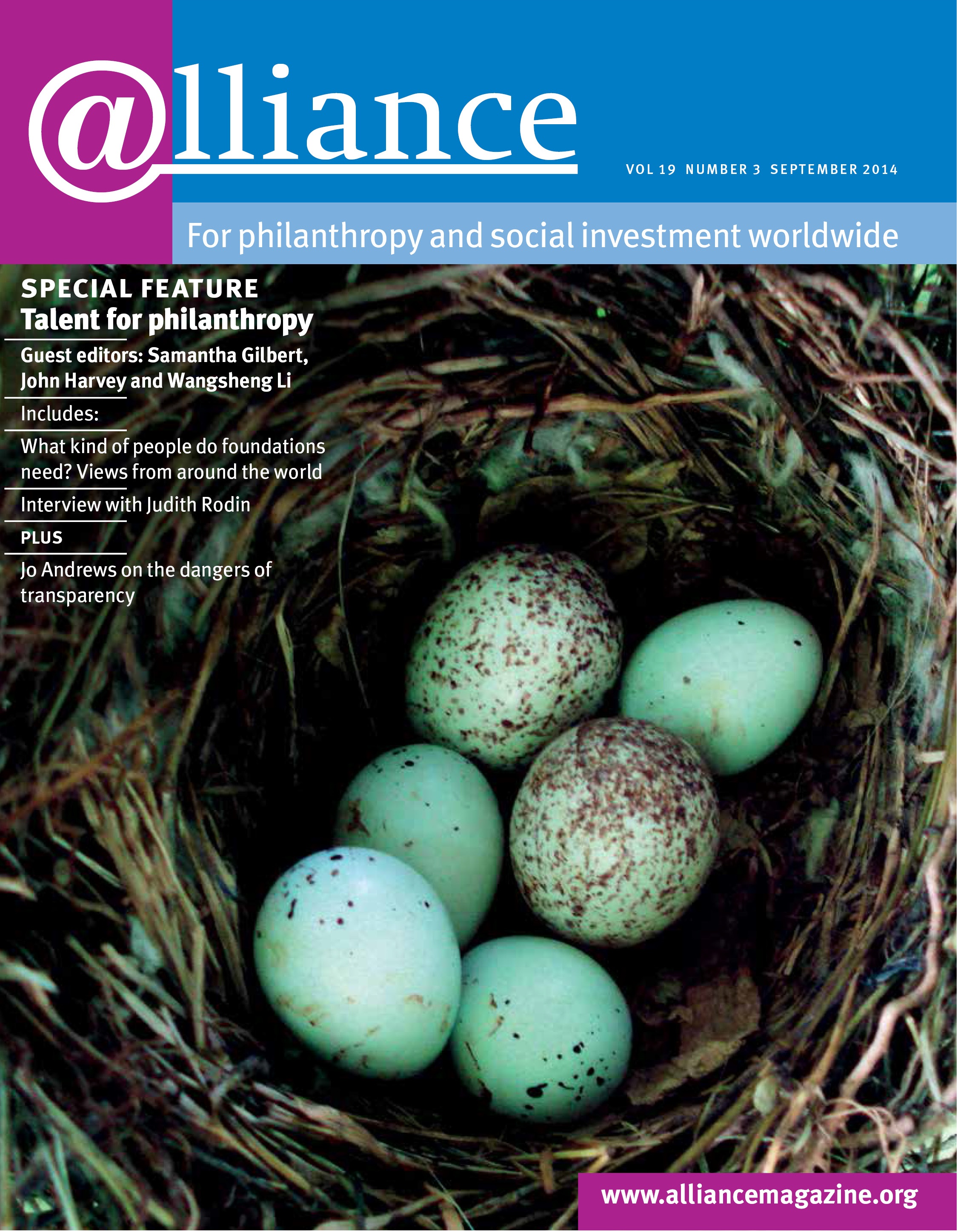How do we find and keep the right people? How do we meet their expectations and provide opportunities for further development? What is the right balance between financial incentives and inspiration for work aiming at the public good? These and similar questions are on the agenda of most foundation executives in Russia today.
According to the Russia Donors Forum 2013 annual report, the 87 foundations analysed have almost 600 full-time employees. Of these, this article covers private foundations, corporate foundations, endowed foundations (universities, museums, other organizations) and fundraising foundations, but not community foundations.The last 20 years have seen a transformation in the sector’s staff, from enthusiasts to professionals. Along with this, there has emerged another type of professional, people who often have no systematic education in NGO management or similar fields and who got their knowledge from experience of running projects and short-term trainings.
Even today the sector has very few people with appropriate degrees, partly because of the lack of such courses in Russia and partly because the philanthropic sector is still not as financially or socially attractive for recent graduates as the business sector or civil service.
The Russian philanthropic sector is rather a narrow segment of the job market, and the level of turnover is relatively low. Because of the flat organizational structure and limited opportunities for vertical career development, people mostly move within the sector when they seek career growth.
In general, the sector offers lower financial remuneration than the business sector. Few foundations offer competitive salaries; the best-paid positions (at the programme officer level) are within the US$3,000–US$5,000 per month salary range. In exceptional cases, foundation executives receive US$7,000–US$10,000 per month. However, the level of wages in the philanthropic sector is higher than in the NGO sector in general, the civil service or academia.
Disparity in wage levels does not only operate between sectors, it sometimes arises within the sector itself. Because the job market is still developing, there is no common understanding of the competencies needed for positions, especially those that are difficult to define, like programme officer. As a result, at different foundations or even within one organization, there could be significantly different rates of pay for posts demanding similar skills. In such cases, rates of pay are dictated by available resources, previous compensation received and expectations.
However, there is a growing understanding in the sector of the need to manage talent. There are more and more examples of domestic foundations developing and formally adopting special policies aimed at solving two problems: how to attract talented individuals and how to retain them.
These policies are based on the traditional instruments:
- adoption of special hiring schemes based on measuring candidates’ motivation to move to the sector to ensure that new hires share the organization’s mission and values;
- different forms of bonus: extra days off, additional medical insurance, financial bonus based on job performance, flexible work schedules;
- opportunities for personal development: short trainings, conference participation, partial coverage of tuition fees;
- room for carrying out personal consultancy projects if they don’t conflict with the main job;
- special recognition awards.
Despite their variety, most of these instruments are still not used systematically. Not surprisingly, it is still difficult to attract people with the right set of abilities. While the growing number of people with business backgrounds shows that people are willing to accept relatively lower compensation in order to work for a mission they believe in, the applicability of business skills and methods to the philanthropic sector is often overestimated.
In general, as recent observations show, the effect of non-financial incentives such as ability to do good and help people in need, friendly atmosphere because of shared values, direct involvement in social transformation, and public recognition is much greater than that of financial incentives.
Despite some progress, therefore, the Russian foundation sector needs to work out effective and systematic ways of attracting employees with the right mix of skills and motives and rewarding them appropriately.
Oksana Oracheva is executive director of the Vladimir Potanin Foundation. Email oracheva_oi@fondpotanin.ru
Two clicks to clarity: a comment from the UK
Stuart Etherington
The news last summer that the chief executives of some of the UK’s leading charities earn six-figure salaries provoked criticism from both politicians and the public. The news, and the risk it posed to the reputation of the charity sector as a whole, was the catalyst behind the Executive Pay Inquiry, launched by NCVO.
These figures are of course not representative of the majority of charities in the UK. Less than 1 per cent employ a member of staff earning £60,000 or more. However, there are roughly 530 charities in the UK with a budget of at least £10 million. Such charities need to attract skilled and knowledgeable people to manage budgets and ensure value for money, and it would be naive to imagine that this talent comes free. As Oksana Oracheva points out, unsatisfactory financial compensation risks the loss of talented people to the private sector instead.
However, as the influence and importance of the charity sector in society continue to increase, so, naturally and rightly, does the scrutiny to which our organizations are subjected.
The inquiry recommended a standard of openness about senior pay that goes beyond the minimum required by law, with the names, roles and exact salaries of senior staff being published. The inquiry called for ‘two clicks to clarity’, with information about pay and benefits to be posted on an organization’s website ideally no more than two clicks away from the home page. Alongside salary information, it recommended that charities explain why they pay the salaries they do, so that donors and others can understand the decisions involved and decide for themselves what they consider reasonable. This will ensure that donors know where their money is going, remind trustees of the importance of demonstrating impact and value for money, and protect the reputation of the charity sector in the future, by showing that we cannot be accused of hiding or obfuscating this basic information.
Charities and foundations in the UK continue to enjoy high levels of public trust, according to research carried out by the Charity Commission.[1] To uphold that trust, we must make available clear information about our organizations and how and why we make decisions.
1 Civil Society News: http://tinyurl.com/charitiesUK
Stuart Etherington is chief executive of the NCVO. Email Helen.Raftery@ncvo.org.uk
Do you feel charitable? A comment from China
Wangsheng Li
Until recently, it was not done to talk about salaries and compensation in the philanthropy sector in China. In fact much of what Oksana Oracheva discusses in her article on foundation executive pay in Russia is also what challenges the Chinese philanthropy sector.
A confusion between doing charitable acts and providing charitable services has led to a lopsided argument that professionals in the philanthropy sector should not be in it for the money but out of commitment to the public good. An unintended consequence of that argument is that the public is led to regard philanthropy as a form of volunteerism rather than a career option, while foundations are pressured to keep salary scales comparable with the non-profit sector at large. Unless an aspiring individual is independently affluent, financial considerations would force him/her to pause before taking the philanthropy plunge. Again and again, we hear people lamenting how low pay has stopped them choosing philanthropy as a career.
Several yet-to-be-published surveys on salaries for professional grantmakers in China point to the growing realization that low pay is a major obstacle to encouraging more talented people to consider a career in grantmaking, exacerbating a dire shortage of talent for the charity sector in China.
Interestingly, observes Tao Ze, vice president of the China Foundation Center, ‘foundations with board members predominantly from the business sector tend to pay higher salaries than those with other backgrounds.’ A private foundation in China recently announced a search for a CEO by offering a salary of the equivalent of US$180,000, almost ten times the national average personal income (Chinese charity regulations dictate that salaries for the charity sector cannot exceed 200 per cent of the average personal incomes in a given region).
As the foundation’s founding chairman explained, the aim was to hire someone of high calibre, the best of the best. For industry observers, it reflects two issues: (a) salaries for the philanthropy sector are rather low and uncompetitive and (b) low salaries discourage talented people from choosing philanthropy as a career. The road to generosity may be paved with gold but a career path in charity can be strung with hardships.
Wangsheng Li is president of ZeShan Foundation (Hong Kong). Email wangshengli@zeshanfoundation.org




Comments (0)